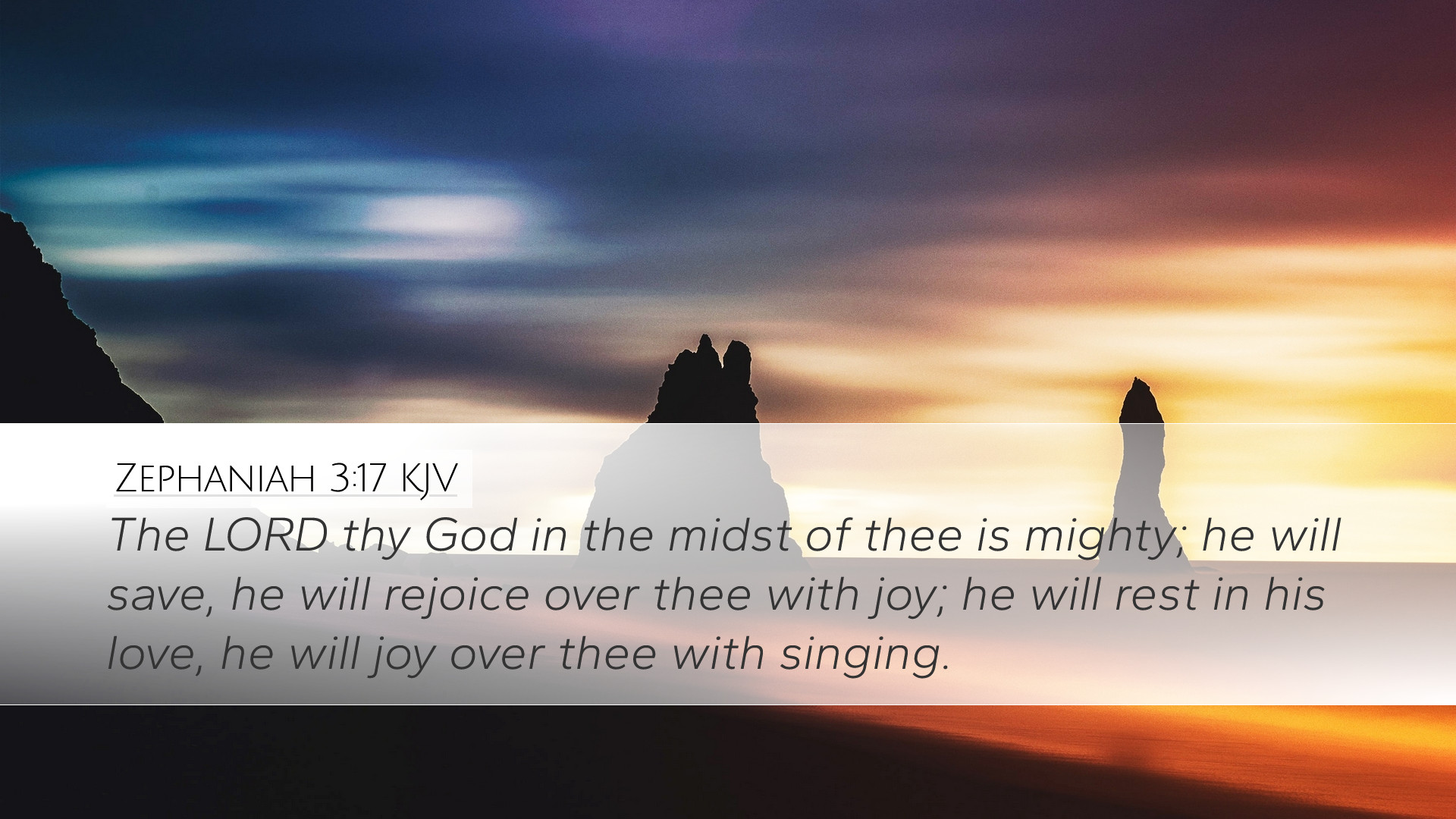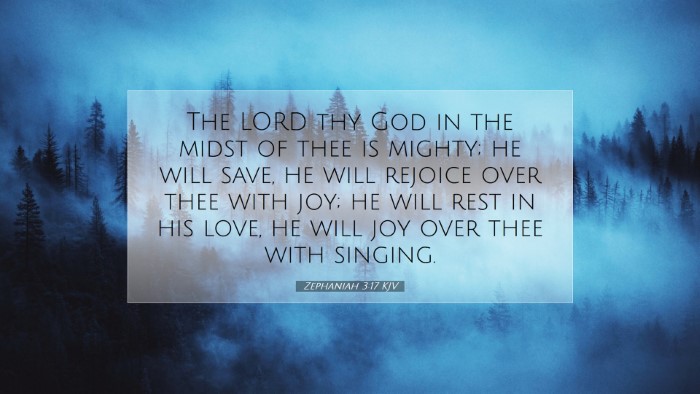Old Testament
Genesis Exodus Leviticus Numbers Deuteronomy Joshua Judges Ruth 1 Samuel 2 Samuel 1 Kings 2 Kings 1 Chronicles 2 Chronicles Ezra Nehemiah Esther Job Psalms Proverbs Ecclesiastes Song of Solomon Isaiah Jeremiah Lamentations Ezekiel Daniel Hosea Joel Amos Obadiah Jonah Micah Nahum Habakkuk Zephaniah Haggai Zechariah MalachiZephaniah 3:17
Zephaniah 3:17 KJV
The LORD thy God in the midst of thee is mighty; he will save, he will rejoice over thee with joy; he will rest in his love, he will joy over thee with singing.
Zephaniah 3:17 Bible Commentary
Commentary on Zephaniah 3:17
Bible Verse: "The Lord your God is in your midst, a mighty one who will save; he will rejoice over you with gladness; he will quiet you by his love; he will exult over you with loud singing."
Introduction
This verse from the Book of Zephaniah encapsulates the profound themes of divine presence, salvation, and the tender love of God towards His people. The Lord’s reassurance amidst the threat of judgment emphasizes His desire for relationship, joy, and peace with His faithful. Below, we explore insights from various public domain commentaries to deepen our understanding of this scripture.
God’s Presence in Our Midst
Matthew Henry notes that this declaration of God's presence signifies His immediate involvement in the lives of His people. The phrase "in your midst" reveals that the Lord is not a distant deity but one who dwells among us, offering His protection and guidance. This central theme assures believers that regardless of their circumstances, God is intimately aware of their struggles and joys.
Albert Barnes emphasizes that this is a direct promise to Israel, which can be extended to the church today. The understanding that God is "in your midst" serves as a foundational truth for believers, affirming that His presence brings strength and comfort. This truth fosters a sense of community among the faithful, knowing they are not alone.
The Mighty One Who Will Save
Zephaniah describes God as a "mighty one who will save." Adam Clarke elaborates on this, indicating that the term "mighty one" can refer to God as a warrior who fights on behalf of His people. This not only conveys His power but also His willingness to intervene in human affairs. The promise of salvation signifies both physical deliverance from enemies and spiritual restoration, emphasizing God’s comprehensive care for His people.
Matthew Henry further argues that this salvation is certain and assured by God’s might. Unlike human warriors, God's power is unfailing. This theme encourages believers to place their trust in God’s ability to deliver, highlighting His supremacy over all adversities.
Rejoicing Over His People
The passage continues, stating that God "will rejoice over you with gladness." Albert Barnes interprets this as an expression of divine joy concerning His people. The imagery of God rejoicing suggests not only His approval but also His celebratory nature towards those who are reconciled with Him. This joy is contrasted with human experiences of disappointment and sorrow, adding depth to the theological implications of God’s delight in His relationship with His people.
Matthew Henry also comments on the idea of God singing over His people. This portrayal brings a warm relational aspect to the divine character. Just as parents rejoice over their children, so too does God take joy in His people. This invites believers into a relationship marked by joy, not fear, encouraging a deep trust in His plans.
Quietness through His Love
Zephaniah reveals that God "will quiet you by his love." Adam Clarke indicates that God's love has a calming effect, providing peace amid life's tumultuous experiences. The assurance of God's love serves as a fortress for the soul, allowing individuals to experience tranquility despite external chaos. This speaks profoundly to the pastoral care provided by God, urging believers to lean on Him for emotional and spiritual stability.
Matthew Henry reiterates that the love of God is not merely passive; it actively works to soothe and calm His people. When believers face anxiety or distress, the invitation to find quiet in God’s love is both a challenge and a comfort, urging reliance on His kindness and mercy.
Exulting with Loud Singing
The climactic promise that God "will exult over you with loud singing" reveals the exuberance of divine affection. Albert Barnes highlights that while humans may find joy in singing, the intensity of God's exultation is unparalleled. His singing symbolizes His fierce love and commitment to His people, conveying that He is both protector and provider.
This imagery of God singing underscores the relational dynamic inherent in worship. Matthew Henry comments that God's singing is an expression of His heartfelt emotions for mankind, suggesting that worship is rooted in a divine love that is reciprocated by human hearts. Believers are invited to respond to this love with their own worship, creating a joyous cycle of praise.
Conclusion
In summary, Zephaniah 3:17 is a profound declaration of God's character and his relationship with His people. Through public domain commentaries, we discern key themes: God's presence, His mighty salvation, His joyful delight in us, the calming power of His love, and the exuberance of His affection expressed through song. For pastors, students, theologians, and Bible scholars, this scripture provides not only doctrinal insights but also a deep relational hope that can transform the believer’s life. In understanding the depth of God's commitment to us, we are called to reflect this love and joy back to Him and to those around us.


